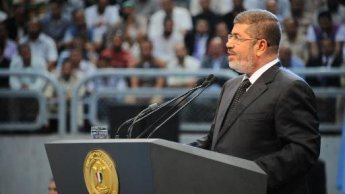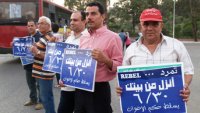www.aljazeerah.info
News, June 2013
Archives
Mission & Name
Conflict Terminology
Editorials
Gaza Holocaust
Gulf War
Isdood
Islam
News
News Photos
Opinion Editorials
US Foreign Policy (Dr. El-Najjar's Articles)
www.aljazeerah.info
|
Editorial Note: The following news reports are summaries from original sources. They may also include corrections of Arabic names and political terminology. Comments are in parentheses. |
Egyptian President Offers to Form Constitution-Amending Committee Ahead of Protests

CAIRO, June 26, 2013 (Xinhua) --
Egyptian President Mohamed Morsi offered on Wednesday to form an independent committee to amend the constitution, with the participation of all political forces and parties.
Morsi said so during a televised speech, only days before the planned massive protests against him to be held on June 30 which marks the first anniversary of his rule.
The president also called for forming a higher committee in charge of "national reconciliation."
Ahead of the Sunday protests which seek to oust Morsi and press for an early election, the embattled president said the country's youths were marginalized and their efforts could be used in the political arena, in forms of parties.
To placate the protesters, mainly the young ones, Morsi assigned all ministers and governors to have deputies younger than 40 years old.
"Oh.. protesters, keep it peaceful." Morsi told protesters that if they insist on going for demonstrations, the country would only slip into violence.
The National Security Council is responsible for taking all the necessary steps to maintain the country's security, he said, adding that "I stand before you as an Egyptian citizen, not as the holder of an office."
In his Wednesday remarks, which Morsi referred to as "a disclosure speech," the president admitted that he had made mistakes since he came to office in June 2012.
"I made efforts along with honest people, so sometimes I was right and sometimes I was wrong," the president said. "I bear my share of responsibility for the current conditions and I am working for correcting them."
Meanwhile, Morsi warned that political divisions in Egypt " threaten to paralyze" the country, blaming enemies of Egypt for hindering its new democracy.
"Egypt faces many challenges. The polarization has reached a stage that could threaten our democratic experience and paralyze the nation," he said, while promising reforms and calling for dialogue in a bid to calm down protesters ahead of Sunday's rallies.
He insisted that he was working for the goals of the " revolution" that toppled ex-President Hosni Mubarak in 2011. "For the revolution to reach its goals, there must be swift reforms at the root, in all the state's institutions and structures."
"I took responsibility for a country mired in corruption and was faced with a war to make me fail," said Morsi, who named some of his "enemies" including former rival in the presidential race, Ahmed Shafiq, Mubarak's last prime minister.
He said that "fugitive Shafiq" had been conspiring against him to urge a coup against a freely-elected president.
"He is wanted and he is abroad plotting and instigating a coup to overthrow the current regime, which is a crime," said Morsi.
The president also took the chance to apologize to the Egyptian people for the ongoing fuel crisis, attributing it to acts of smugglers who trade fuel in the black market.
"A large part of the crisis is made-up," Morsi stressed, saying that the state would continue controlling the provision of petroleum to gas stations "through smart cards."
He said the licenses of some gas stations that declined to work and serve the citizens would be withdrawn.
Hours before Morsi's speech, clashes in Daqahliya governorate of Egypt killed at least two people and injured over 230 after supporters of Morsi staged a march calling for backing the legitimacy of the Islamist-oriented president.
Meanwhile, hundreds have flocked into the Tahrir Square in downtown Cairo, the center of the massive demonstrations that led to the fall of Mubarak in 2011, in preparation for sit-ins. They are mainly from the "Rebel" campaign, which has over the months collected more than 15 million signatures against Morsi.
Egypt's Morsi admits making mistakes in 1st year in office
CAIRO, June 26, 2013 (Xinhua) --
Egyptian President Mohamed Morsi admitted on Wednesday that he has made mistakes since he came to office in June 2012.
"I made efforts along with honest people, so sometimes I was right and sometimes I was wrong," the president said in what he referred to as "a disclosure speech" that he is delivering on Wednesday evening.
"I bear my share of responsibility for the current conditions and I am working for correcting them," he said.
Mosri meanwhile said he has been facing "a war" aiming at making him fail after he was elected as president.
His speech comes only days before the planned protests on June 30 against him and his Muslim Brotherhood group that were urged by activists and opposition leaders who seek to oust Morsi and hold an early presidential election.
Hours before Morsi's speech, clashes in Daqahliya governorate of Egypt killed two and injured over 230 people after supporters of Morsi staged a march calling for backing the legitimacy of the Islamist-oriented president.
Meanwhile, hundreds flocked to the Tahrir Square in downtown Cairo, the center of the massive demonstrations that led to the fall of ex-President Hosni Mubarak in 2011, in preparation for sit- ins. They are mainly from the "Rebel" campaign, which has over the months collected more than 15 million signatures against Morsi.
Editor: yan
==========================

In a televised address Wednesday night marking his first year in office, Egyptian President Mohamed Morsi warned that political polarisation was threatening the country’s democratic process ahead of massive opposition protests over the weekend.
As the world’s most populous Arab nation braced for protests over the weekend, Egyptian President Mohamed Morsi warned that political polarisation was “threatening to paralyse the country” in a long, and at times defiant, televised address Wednesday night.
In a nearly three-hour speech marking his first anniversary in office, Egypt’s Islamist president acknowledged making mistakes. But he also accused unspecified “dark forces” and “enemies of Egypt” of threatening the country.
"Political polarisation and conflict has reached a stage that threatens our nascent democratic experience and threatens to put the whole nation in a state of paralysis and chaos," said Morsi."The enemies of Egypt have not spared effort in trying to sabotage the democratic experience," he added.
Hours before Morsi’s speech, clashes in the northern city of Mansoura killed at least one and injured around 170 others, according to a Health Ministry spokesman.
A member of the Muslim Brotherhood, Morsi is Egypt’s first Islamist president and his one year in office has been marked by deep divisions between pro-Islamist and liberal Egyptians.
But in his speech Wednesday night, Morsi blamed his adversaries – even naming some of them, including a judge and a TV executive – and called on them to stop hurting Egypt’s democratic process.
“What we heard from him tonight was really a very nationalistic speech. He was trying to appear humble by reaching out to Egyptians to pull together for the sake of the country,” said FRANCE 24’s Kathryn Stapley, reporting from Cairo. “But he didn’t seem at all rattled by upcoming protests. He said that he’s the legitimate president under the constitution and that should be respected.”
A nationwide anti-Morsi signature drive
Morsi’s speech came amid heightened tensions and increased
security in major Egyptian cities ahead of Sunday’s planned
protests marking Morsi’s first year in office.
Over the past few months, an opposition campaign called “Tamarod” – or rebellion in Arabic – has launched a petition calling for Morsi’s ouster. Holding the now ubiquitous blue posters, Tamarod volunteers have gathered at public spaces in Egyptian towns and cities, collecting signatures for a petition calling for early elections.
In his televised address Wednesday night, Morsi appeared to dismiss the calls for his ouster, noted Stapley.
“We heard him say there’s only one revolution and that was the January 25, 2011, revolution when former Egyptian President Hosni Mubarak was ousted. By that he clearly meant that the upcoming protests against him this weekend - which some people are calling ‘the second revolution’ - are really not going to work as far as he’s concerned.”
Hard times ahead of Ramadan
In the
run-up to the protests, Egyptians have been stocking up on
essential goods with long lines at gas stations flaying tempers
and increasing the sense of economic malaise ahead of Ramadan, a
period of high-spending for most Muslims.
With frequent power cuts and rising prices, daily life has been getting harder in middle class and lower income neighbourhoods. Egyptian authorities are still awaiting a $4.8 million IMF loan, which was agreed in principle two years ago.
Negotiations for the loan have run into repeated snags, with the IMF calling for more robust reforms. With economic growth down from a pre-2011 average of 7% to around 2% after the uprising, plummeting foreign reserves, rising unemployment and inflation, Egypt’s economy has been battered and is only being kept afloat by loans from Qatar and other regional states.
While Morsi acknowledged that life has been getting hard, he also blamed remnants of the old regime for holding the country back.
“He didn’t sound like a president who’s facing a huge opposition movement,” noted Stapley. “This speech was really a rallying cry to his supporters rather than an embattled president reaching out to his opponents.”
For their part, opposition supporters appeared unconvinced by Morsi’s arguments Wednesday night, said Stapley. “While his speech was going on, there were a few thousand protesters listening in Tahrir Square and they kept shouting, ‘liar’ as well as a lot of other insults as the president gave this speech,” said Stapley.
Fair Use Notice
This site contains copyrighted material the
use of which has not always been specifically authorized by the copyright
owner. We are making such material available in our efforts to advance
understanding of environmental, political, human rights, economic,
democracy, scientific, and social justice issues, etc. We believe this
constitutes a 'fair use' of any such copyrighted material as provided for
in section 107 of the US Copyright Law. In accordance with Title 17 U.S.C.
Section 107, the material on this site is
distributed without profit to those
who have expressed a prior interest in receiving the included information
for research and educational purposes. For more information go to: http://www.law.cornell.edu/uscode/17/107.shtml.
If you wish to use copyrighted material from this site for purposes of
your own that go beyond 'fair use', you must obtain permission from the
copyright owner.
|
|
|
|
||
|
||||||




